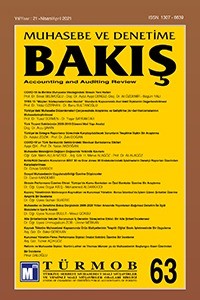EVALUATION OF THE PRINCIPLE VERSUS AGENT CONSIDERATIONS UNDER TFRS 15 “REVENUE FROM CONTRACTS WITH CUSTOMERS” STANDARD
Öz
According to TFRS 15 Revenue from Contracts with Customers Standard, the revenue is recognized
when the performance obligation is fulfilled since the control transfer of the goods or services to the
customer occurs. In order to determine the timing and amount of revenue accurately in the principal
versus agent considerations, which are common in the e-commerce sector and explained in the
Standard’s Application Guidance, the entity should appropriately determine itself as a principle or an
agent. In this study, the principles regarding the recognition and reporting of revenue in TFRS 15 are
explained within the framework of the concept of control, at the same time the transactions occuring
in the principal versus agent considerations are evaluated within this framework and finally the disclosures
of e-commerce corporations’ annual reports regarding the principal versus agent considerations
are examined.
Anahtar Kelimeler
Kaynakça
- Akdoğan N. ve H. Aydın. (1987). Muhasebe Teorileri, Gazi Üniversitesi No: 98.
- Anderson, K., and T. Yohn. (2002). The Effect of 10 K Restatements on Firm Value, Information Asymmetries, and Investor’ Reliance on Earnings. Working Paper, Georgetown University and Indiana University.
- Colson, R.H, Bloomfield, R., Christensen, T.E., Jamal, K., Moehrle, S., Ohlson, J., Penman, S., Stober, T., Sunder, S. ve Watts, R.L. (2010). “Response to the Financial Accounting Standards Board’s and the International Accounting Standards Board’s Joint Discussion Paper Entitled Preliminary Views on Revenue Recognition in Contracts with Customers American Accounting Association’s Financial Accounting Standards Committee”, Accounting Horizons American Accounting Association, 24: 4, 689–702.
- Finansal Raporlamaya İlişkin Kavramsal Çerçeve, http://www.kgk.gov.tr
- Holzmann, O.J. (2011). “Revenue Recognition Convergence: The Contract-Based Model”, Journal of Corporate Accounting and Finance, 22, 87-92.
- Holzmann, O.J. ve Munter, P. (2014). “New Revenue Recognition Guidance”, The Journal of Corporate Accounting ve Finance, Wiley Periodicals, Inc September/October, 73-76.
- IFRS 15 (2014). “Revenue From Contracts with Customers. Basis For Conclusions”.
- Olsen, L. ve Weirich, T.R. (2010). “New Revenue Recognition Model”, Journal of Corporate Accounting and Finance, 22: 55-61.
- Özerhan,Y. ve Sultanoğlu, B. (2019). Lisans Sözleşmelerinden Doğan Hasılatın TFRS 15 Kapsamında Muhasebeleştirilmesi: Yazılım Sektöründe Bir Araştırma. Muhasebe ve Finansman Dergisi – Ağustos 2019 Özel Sayı: 15-32.
- Özerhan, Y. ve Sultanoğlu, B. (2020). MSUGT-TMS/TFRS Karşılaştırmalı Uygulamalı BOBİ Finansal Raporlama Standardı, 2. Baskı, Gazi Kitabevi.
- Özerhan, Marşap Ve Yanık. (2015). IFRS 15 Müşterilerle Yapılan Sözleşmelerden Doğan Hasılat Standardının İrdelenmesi. Muhasebe Bilim Dünyası Dergisi, 17 (2): 193-226.
- Şavlı, T. (2015). UFRS 15 Kapsamında Açıklama ve Örneklerle Hasılatın Raporlanması, İSMMMO Yayınları, 164.
- TFRS 15 “Müşteri Sözleşmelerinden Hasılat”, http://www.kgk.gov.tr
- TFRS 10 “Konsolide Finansal Tablolar”, http://www.kgk.gov.tr
TFRS 15 “MÜŞTERİ SÖZLEŞMELERİNDEN HASILAT” STANDARDI KAPSAMINDA ASIL-VEKİL İLİŞKİSİNİN DEĞERLENDİRİLMESİ
Öz
TFRS 15 Müşteri Sözleşmelerinden Hasılat Standardı’nda, müşterinin mal veya hizmetin kontrolünü
elde etmesinin sonucunda, işletme edim yükümlülüğünü yerine getirmiş olmakta ve hasılat kayda
alınmaktadır. Günümüzde, özellikle e-ticaret sektöründe yaygın olan ve Standardın Uygulama Rehberi’ndeki
özellikli konulardan biri olarak ele alınan asıl-vekil işlemlerinde, hasılatın doğuş zamanı ve
tutarının doğru belirlenmesi için mal veya hizmet sunumunu gerçekleştiren tarafın asıl mı yoksa vekil
mi olduğunun doğru olarak tespit edilmesi gerekir. Bu çalışmada, TFRS 15’te hasılatın muhasebeleştirilmesi
ve raporlanmasına ilişkin ilkeler kontrol kavramı çerçevesinde açıklanarak, asıl-vekil ilişkisinin
mevcut olduğu işlemler bu çerçevede değerlendirilmiş ve e-ticaret yapan işletmelerin faaliyet
raporlarındaki asıl-vekil ilişisine ilişkin dipnot bilgileri incelenmiştir.
Anahtar Kelimeler
Kaynakça
- Akdoğan N. ve H. Aydın. (1987). Muhasebe Teorileri, Gazi Üniversitesi No: 98.
- Anderson, K., and T. Yohn. (2002). The Effect of 10 K Restatements on Firm Value, Information Asymmetries, and Investor’ Reliance on Earnings. Working Paper, Georgetown University and Indiana University.
- Colson, R.H, Bloomfield, R., Christensen, T.E., Jamal, K., Moehrle, S., Ohlson, J., Penman, S., Stober, T., Sunder, S. ve Watts, R.L. (2010). “Response to the Financial Accounting Standards Board’s and the International Accounting Standards Board’s Joint Discussion Paper Entitled Preliminary Views on Revenue Recognition in Contracts with Customers American Accounting Association’s Financial Accounting Standards Committee”, Accounting Horizons American Accounting Association, 24: 4, 689–702.
- Finansal Raporlamaya İlişkin Kavramsal Çerçeve, http://www.kgk.gov.tr
- Holzmann, O.J. (2011). “Revenue Recognition Convergence: The Contract-Based Model”, Journal of Corporate Accounting and Finance, 22, 87-92.
- Holzmann, O.J. ve Munter, P. (2014). “New Revenue Recognition Guidance”, The Journal of Corporate Accounting ve Finance, Wiley Periodicals, Inc September/October, 73-76.
- IFRS 15 (2014). “Revenue From Contracts with Customers. Basis For Conclusions”.
- Olsen, L. ve Weirich, T.R. (2010). “New Revenue Recognition Model”, Journal of Corporate Accounting and Finance, 22: 55-61.
- Özerhan,Y. ve Sultanoğlu, B. (2019). Lisans Sözleşmelerinden Doğan Hasılatın TFRS 15 Kapsamında Muhasebeleştirilmesi: Yazılım Sektöründe Bir Araştırma. Muhasebe ve Finansman Dergisi – Ağustos 2019 Özel Sayı: 15-32.
- Özerhan, Y. ve Sultanoğlu, B. (2020). MSUGT-TMS/TFRS Karşılaştırmalı Uygulamalı BOBİ Finansal Raporlama Standardı, 2. Baskı, Gazi Kitabevi.
- Özerhan, Marşap Ve Yanık. (2015). IFRS 15 Müşterilerle Yapılan Sözleşmelerden Doğan Hasılat Standardının İrdelenmesi. Muhasebe Bilim Dünyası Dergisi, 17 (2): 193-226.
- Şavlı, T. (2015). UFRS 15 Kapsamında Açıklama ve Örneklerle Hasılatın Raporlanması, İSMMMO Yayınları, 164.
- TFRS 15 “Müşteri Sözleşmelerinden Hasılat”, http://www.kgk.gov.tr
- TFRS 10 “Konsolide Finansal Tablolar”, http://www.kgk.gov.tr
Ayrıntılar
| Birincil Dil | Türkçe |
|---|---|
| Konular | İşletme |
| Bölüm | İnceleme Makalesi |
| Yazarlar | |
| Yayımlanma Tarihi | 1 Nisan 2021 |
| Gönderilme Tarihi | 19 Şubat 2021 |
| Kabul Tarihi | 24 Mart 2021 |
| Yayımlandığı Sayı | Yıl 2021 Cilt: 21 Sayı: 63 |


